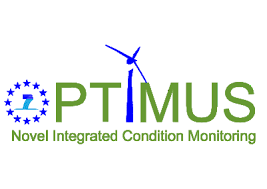Demonstration of methods and tools for the optimisation of operational reliability of large-scale industrial wind turbines (OPTIMUS)
Ref.: FP7-ENERGY-2012-2-322430
Funded by: EUROPEO – PROYECTOS 
From: 01/06/2013 to: 02/06/2016
The consortium: UCLM, NAREC, INGETEAM, UOB, SKM, ISQ, INDRA, FELDMAN, UCLM, D2S, USFD, ROMAX, TERNA
Granted: 5.500.000 €
Web: http://optimusfp7.eu/
Objective
The power output from wind turbines has increased dramatically over the past thirty years from 50 kW to 6 MW, while 8-12 MW turbines are in the stage of design. State-of-the-art condition monitoring systems, such as vibration-based systems and temperature sensors, are able to monitor and evaluate the current condition of components of interest. Nonetheless, varying wind loads can result in the generation of false alarms or even misinterpretation of the data collected. In addition, commercially available condition monitoring systems offer no or very limited prognostics capability with regards to the remaining lifetime of a component before a serious fault occurs. Therefore evolution to predictive maintenance strategies is currently impossible. Experience has shown that by combining disparate data sources wind farm operators will be able to move from common reactive maintenance approach to a more cost effective risk-based operation and maintenance strategy with a high level of predictive maintenance scheduling. OPTIMUS will develop and demonstrate in the field novel methods and tools for prognosis of the remaining lifetime of key components based on data acquired by a cost-effective wind turbine condition monitoring system implemented by custom-designed dependable computing systems. This technology will reduce the total cost of energy and advance the deployment of large scale offshore and onshore wind energy by increasing availability and reducing downtime due to unplanned maintenance. Predictive maintenance will also reduce costs incurred from secondary damage to components and enable maintenance activities (and the associated costs) to be optimized with respect to forecast revenue from power generation. The results of this project will lead to a significant step-change over the current capability of commercial condition monitoring systems.
Issues to be assessed and demonstrated during the project include:
- Detailed analysis of key failure modes of wind turbines
- Collection and analysis of failure data
- Assessment of current condition monitoring systems
- Definition of the key reliability issues of wind turbines
- Development of an energy costing model
- Gearbox reliability
- Gearbox design reliability review
- Drive-train failure root cause analysis
- Drive-train simulation and analysis
- Development of prognostic life models for drive-train
- Condition monitoring of wind turbine electrical and power systems
- Wind turbine instrumentation and collection of data
- Computer modelling and simulation
- Implementation of an enhanced condition monitoring methodology for wind turbine power electronics
- Load independent condition monitoring of wind turbines
- Analysis of the effect of variable loads
- Filtering variable load effect
- Evaluation of load independent condition monitoring methodology under actual conditions
- Cost effective condition monitoring technology for wind turbines
- Assess condition monitoring requirements
- Condition monitoring data fusion
- Development of prognostics methodology
- Field-based evaluation of achieved reliability
- Training
- Proposals for standards and updating
- Development of training procedures

